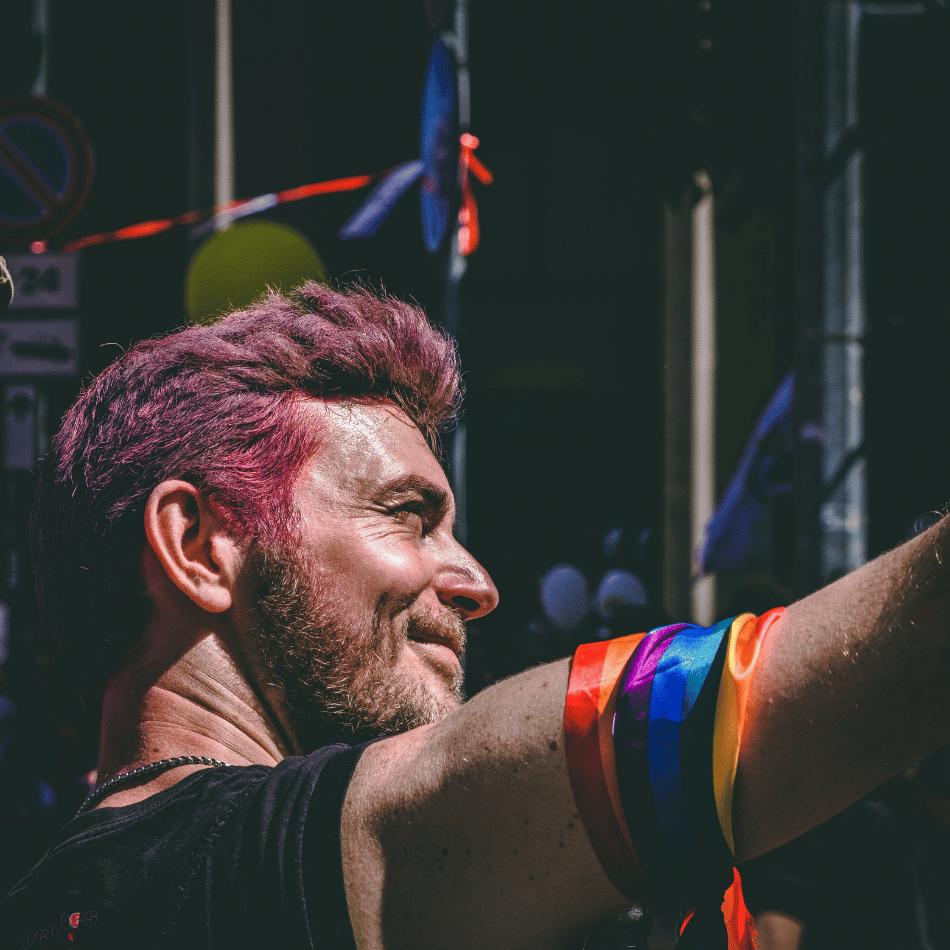7 Tips for Coming Out Later in Life from a Licensed Therapist
Takeaway: Coming out later in life doesn’t mean you’re behind—it means you’re ready now, and that’s what matters. As a therapist who helps people navigate this kind of stuff all the time, I want to share some honest, no-fluff tips to help you navigate this process your way. You don’t have to do it alone!
I’m Chelsea Newton, a queer, bisexual sex therapist who came out “late.” I was well into my 20s before I came out, and more than a decade later, I'm still in the coming out process. Besides my lived experience as a queer "late bloomer," I'm a sex therapist based in Colorado. I have a master's degree in Human Sexuality from The Center for Human Sexuality Studies at Widener University, and I've helped dozens of individual therapy clients come out later in life.
Here are my 7 tips for how to come out of the closet and embrace your authentic self.
**Spoiler alert: "Late" is a myth when it comes to living authentically. You feel like you've wasted time 💔While there is space for your grief, the truth is, your timing is just right.
Real-world coming out advice (from someone who’s been there)
The first time I publicly came out, I was being filmed for a Pride month video. The person behind the camera literally laughed out loud. OUCH! I was so shut down by this person's negative (and biphobic) reaction that it took me a long time to gain the courage to share my sexual orientation again. My baby queer self would loved practical advice on how to come out as bi and protect my heart along the way. If you are coming to terms with being gay, lesbian, bisexual, transgender, or any other identity under the queer umbrella then these tips are for you.
#1 Be nice to yourself.
Why it’s important: Well, the world is cruel enough. Showing yourself compassion and self love while embracing your own identity is essential to coming out in later life.
How to try it: Positive affirmations or small acts of celebration are an easy way to show yourself some love. Saying something like, "my identity is valid" or "I'm allowed to make decisions that are right for me" can increase self-esteem and mental well being.
If we were in session… I'd be your ultimate hype girl. You practiced a positive affirmation- GO YOU! You bought yourself the flower bouquet at Trader Joe's because it had the colors of the lesbian flag and was a safe way to embrace your identity? I'M SCREAMING! Ok, I won't actually scream at you in session, but I am there to help you identify progress, even if it feels small to you.
#2 Come in to come out.
Why it’s important: Understanding your internal landscape (coming in) will make navigating the external landscape (coming out) easier.
How to try it: Understanding the feelings you have around being queer (an umbrella term for just about any identity that is not cis/straight) helps increase confidence for when you share with those outside yourself. Coming in is a great time to seek confidential, professional support. You can also use this amazing resource from fellow sex therapist, Casey Tanner LPC, CST, to explore identity labels. Her worksheet will help you tune into your self and offers writing prompts for self-exploration. Come in to come out.
If we were in session… I would be curious with you and allow you to feel what's happening. Coming out to yourself can be as difficult as coming out to others. I would encourage you to take all the time you need.
#3 Pace yourself.
Why it’s important: Coming out is a marathon, not a sprint. You may feel pressure to "get it over with," but the reality is that coming out is not a one time event. It's a life long process.
How to try it: Start with a few friends you are comfortable sharing with or even just one person you think will respond positively. After you talk things through, check in with yourself on how it feels. Are your palms sweaty? Do you feel anxious or uncertain? Are you crying happy tears because someone FINALLY knows? Checking in with your body while coming out to trusted people is one indicator of how it might feel with others.
If we were in session… I would warn you against a coming out "hang over." Yes, I have seen this happen too many times to count. You finally work up the courage to tell the world, you post it to social media, you call your mom in Indiana, you text the bestie group chat, and before you know it you are inundated with everyone else's reactions and feelings to your exciting news. Coming out can feel so relieving, but I encourage you to do it at your own pace. Remember, this is a marathon, not a sprint.
#4 Start with the people you trust.
Why it’s important: Having a person, even one, who knows how you are feeling can make a huge difference on your health.
How to try it: Choose your most trusted person and let them know what's on your mind. You don't need to have the exact words or "right" label to describe who you are. Just tell them what's going on. Speak honestly and allow them to embrace you with open arms. Only you will know who you feel best with in this extremely vulnerable moment. Trust yourself and go for it!
If we were in session… I would lovingly remind you that anything can happen when you come out. Even your closest friends or family may need their own time to process what you are telling them. Focus on sharing your own experience. Remember that other people's reactions don't change who you are. When in doubt, see tip #1.
#5 Expect mixed reactions and prepare for them.
Why it's important: Everyone has an opinion. Some people will embrace your queerness with a squeal of delight. Others will be complete assholes. You don’t owe anyone a perfect explanation and you get to decide who you want to share with. Coming out isn't an invitation for interrogation. You never have to share details you don't feel comfortable with. Remember, you are in control of how you want to come out and who you come out to.
How to try it: Practice in lower stakes situations before approaching higher stakes situations. Talking on the phone or via facetime may be safer than a face to face conversation with someone you expect could react negatively. If someone has a negative reaction, hang up, walk away, or steer the conversation somewhere else. In healthy relationships, people respect one another. If someone is disrespectful, it's ok to take a step back and reassess the relationship.
If we were in session... I would ask if you have a sense of who feels most intimidating to come out to. I'd get curious about the pros and cons of coming out to certain people in your life. Just because you come out to some folks, doesn't mean you have to come out to others.
#6 Find queer community
Why it's important: Society is not especially friendly toward LGBTQ+ people in 2025. Meeting people who accept and celebrate your queerness is the MOST important thing you can do for your mental health. You need a support network that makes you feel safe. During times like these, it's understandable to feel scared and uncertain, but the queer community has been here before. As Chase Strangio reminds us - The courts will not free us. But we still have each other.
How to try it: Explore local LGBTQ+ resources in your community. Look for places that display the pride flag or host drag shows. Go to your local library or coffee shop and check out the community board for upcoming events. Don't be afraid to find queer community online! Social media is a great way to check out LGBTQ+ culture and resources before putting yourself out there. If you're near Denver, check out my favorite LGBTQ+ organizations. If your not near Denver and need specific recommendations, just email me! I'm a social worker, which makes me a literal expert in finding resources. I got you.
If we were in session... I would say, "welcome." When you work with me, you are in community with another queer person. Our relationship is professional, which means I can't party with you at Pride events, but that doesn't mean we don't celebrate together. I will always accept you for who you are and you better believe we will celebrate your wins together.
#7 Have fun with sexual expression
Why it’s important: We all have gender expression. It's the way we express our gender, including physical appearance, clothing, hairstyles, and behavior.
How to try it: How long have you been considering cutting your hair short or getting that septum piercing? You have control over how you express your gender identity. If it's safe for you, try something new! Even simple outward expressions of your budding queerness can make you feel, well, amazing! Gender euphoria, anyone?!
If we were in session... We would get into a more nuanced conversation about how depending on resources and environment, this may be more doable for some than others. If you worry that your gender identity or gender expression may jeopardize your safety, we'd talk about helpful ways to honor yourself while staying safe.
How a therapist can help with coming out as an adult
Coming to terms with sexuality is a process. It's normal to need and want support around gender identity, sexual orientation, and how to come out as gay to your family. People I support in therapy have exhausted other resources and need specific support for their situation.
Meeting with a sex therapist helps you explore and make sense of the emotions of coming out as an adult. You may be navigating a breakup, divorce, co-parenting, or the stress of telling family. A queer affirming therapist is there to support you every step of the way.
Final thoughts
I hope that these tips help you feel less intimidated and more supported. When in doubt, be kind to yourself. Coming out is a deeply personal and vulnerable experience. Pacing yourself and building a support network are critical to the process.
My therapy practice is dedicated to supporting LGBTQ+ people embrace and enjoy who they are. If you are struggling with coming out as lesbian, trans, non-binary or anything else, I would love to support you.
I offer individual therapy (CO) and sexuality coaching to anyone in the United States. Are you ready to live your most authentic (queer) life?! Book a free vibe check (aka consultation) so that we can meet 1:1, check the vibes, and talk about how I can best support you. I can't wait to meet you!



